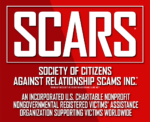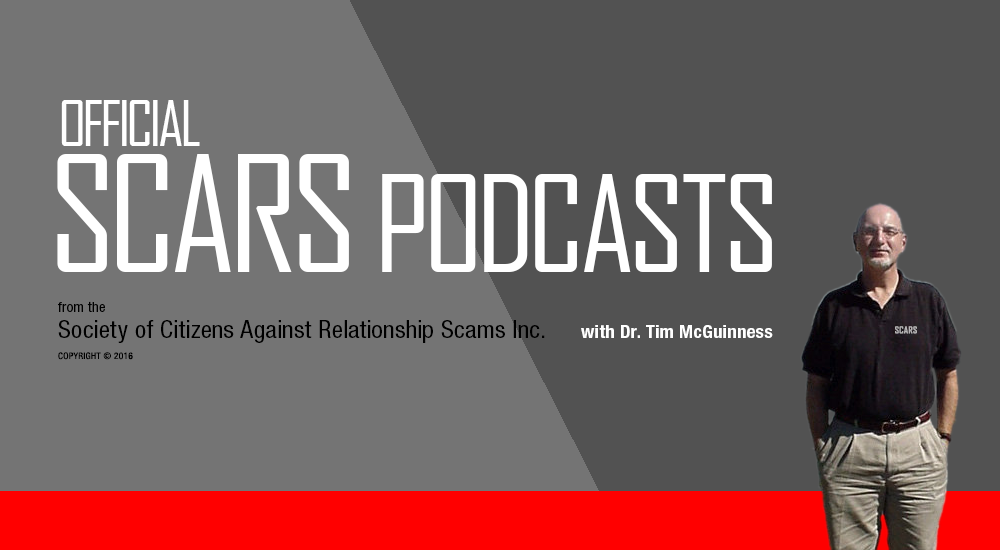Psychology of Scams Part 1 – SCARS|PODCAST™
Happy Saint Patrick’s Day!
To learn more about the Psychology of Scams Click Here »
If you want to share this podcast, click on the link below
To download a copy of this SCARS Podcast MP3 file click here »
To Hear All Of Our SCARS|PODCASTS™ Click Here »
– – – – –
Copyright © 2019 Society of Citizens Against Relationship Scams Incorporated [SCARS]
Third-Party Copyrights Acknowledged

A Division Of The Society Of Citzens Against Relationship Scams Inc. [SCARS]
RSN Founded 1991 • SCARS Founded 2015
www.AgainstScams.org

SCARS™ Team
A SCARS Division
Miami Florida U.S.A.
Tags: Psychology of Scams, ASMR, Stranger Trust, Victim Motivation, Rudeness, Distrust, Politeness, Polite, Sending Money, Romance Scam, Online Fraud, Helping Strangers,
Report All Scammers Here Or On www.Anyscam.com
To Join SCARS Visit www.AgainstScams.org
Legal Notices:
All original content is Copyright © 1991 – 2020 SCARS All Rights Reserved Worldwide & Webwide. Third-party copyrights acknowledge.
SCARS, RSN, Romance Scams Now, SCARS|GLOBAL, SCARS|WORLDWIDE, SCARS, Society of Citizens Against Relationship Scams, Society of Citizens Against Romance Scams, SCARS|ANYSCAM, Project Anyscam, Anyscam, SCARS|GOFCH, GOFCH, SCARS|CHINA, SCARS|UK, SCARS|NZ, SCARS|AUSTRALIA, SCARS|INDONESIA, SCARS|CDN, SCARS Cybercriminal Data Network, Cobalt Alert, Scam Victims Support Group, are all trademarks of Society of Citizens Against Relationship Scams Incorporated.
Contact the law firm for the Society of Citizens Against Relationship Scams Incorporated by email at legal@AgainstScams.org



Not sure if my first comment went through. SCARS is an excellent website which I’ve posted as a link on my new blog: conartistdating.com
I would like to partner with your agency to give more voice to victims through my blog.
Thank you Millie, we do our best! Please visit our website to join as a “Group” http://www.AgainstScams.org and one of the SCARS Membership team will follow up as soon as possible.
I have seen a lot of romance scams over the years and want to be part of the solution by partnering with your organization through my blog ( conartistdating.com) and other ways. I am passionate about bringing honesty back to relationships and smoking out con artists.
We moderate every comment everywhere to make sure that everything is authentic and not from a scammer! Thank you again for your comment.
I assure you that I am not a scammer. I just started my blog (www.conartistdating.com) three days ago so you can see that I’m a real person; I’m still working out some kinks in my blog design. I’m also a specialist on human behavior who dedicated many years to helping people with mental illnesses. Scammers, cons are personality disordered, the type that needs to be exposed and contained for the protection of others. I look forward to giving victims a voice in my blog and working with your agency.
We did not accuse you of being a scammer, just explaining why we moderate and manually approve each comment. Actually, scammers are not mentally ill, they are simply criminals. Spreading urban legends is neither healthy nor factual. As a victim, you need to recognize that you are not an expert in the subject and by pretending to be one you lead other victims astray and can actually cause more trauma than they originally experienced. We urge you to read or Code of Conduct on our SCARS website http://www.AgainstScams.org – we urge you to back off trying to be people’s savior and focus on your own recovery.
Thank you for your honesty, painful but true. I will back off. I am not a victim directly anyway. My adult son is the victim of a woman who is manipulating him into marriage while she empties his pockets through her wanderlust. My whole family sees it but he does not. I agree cons are criminals and should be treated as such.
Again, I apreciate your reply. Me and my family are distraught over my son’s situation. It turns out that I have in the past worked with mostly women who have been taken by men. Now that the con is closer to home, I understand it better, or so I think. Thank you again.
Millie, you may want to join one of our support groups for friends and family of scam victims in denial on Facebook – here is the link: https://www.facebook.com/groups/RSN.Family.Support